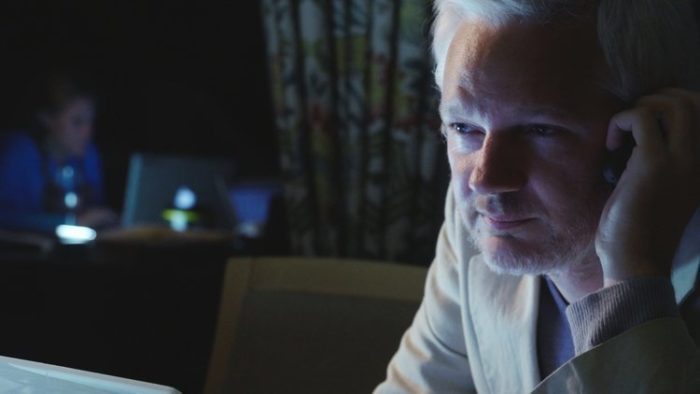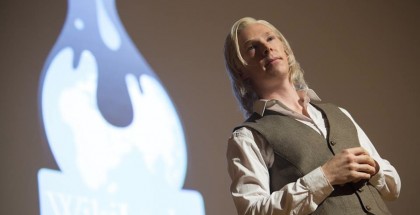VOD film review: Risk
Review Overview
Access
7Insight
5David Farnor | On 04, Jul 2017
Director: Laura Poitras
Cast: Julian Assange
Certificate: 15
Watch Risk online in the UK: Apple TV (iTunes) / Prime Video (Buy/Rent) / Rakuten TV / Google Play
Julian Assange. The reaction you have to that name alone says a lot about how polarising the man has become. The founder of Wikileaks back in 2006, his dedication to transparency in the public interest won him legions of fans around the world, only for that reputation to become clouded by both sexual assault allegations and the complexities of national security and hacking in their own right. It’s hard to think of anyone who has gone from hero to persona non grata so quickly.
Assange has, of course, been holed up in the Ecuadorian embassy ever since 2012, after seeking asylum there – in a move to avoid being extradited to Sweden, where he is wanted for questioning over the allegations, which could then lead to extradition to the USA, where the Justice Apartment has been investigating Wikileaks, after it released diplomatic cables stolen by former US soldier Chelsea Manning. Manning was released in May this year, following an order by President Barack Obama, which Assange welcomed as a victory. Sweden, meanwhile, has said that it has dropped its rape investigation.
Still keeping up? That’s how quickly the world flies past in these confused, muddy waters – and that’s before Lady Gaga shows up at the embassy to interview Julian. “Do you ever feel like just crying?” she asks.
It’s that kind of detail, simultaneously revealing and absurd, that makes Risk something of a must-see, despite its shortcomings. Gaga, tellingly, gives Assange the grilling of his life, throwing him off balance by quizzing him on takeaway food and demanding to know exactly who is chasing him. He answers by dismissing the idea of pretending that he’s a normal person – a response that tells you all you need to know about his fanatical commitment to his cause, and the self-important arrogance that goes with it.
Poitras, who documented Oliver Snowden in Citizenfour, is no stranger to such figures, and you can easiy understand why she might be rather enamoured with the ultra-principled Assange. But where once his name was synonymous with the crusading work of Wikileaks, which has irreversibly changed the media and political landscape in the last decade, he now cuts a less impressive figure: hiding away in the embassy, his narrative has fizzled into a dead-end, to some degree, which makes for less compelling viewing than the unfolding urgency of Citizenfour.
But that lack of excitement is made up for, on the most part, by the sheer access that Poitras has – we not only go inside the embassy with Assange, but see his planning with colleague Sarah Harrison, as they prepare for press conferences about their latest data-dumps, watch as he sits in the woods, or even chills on the beach. Poitras takes a diversion into the story of tech guru Jacob Appelbaum, perhaps in an attempt to spice up the stakes with actual events, but it’s catching glimpses of Assange insisting the Swedish allegations is a “feminist conspiracy” that sparks the real interest. Poitras lets us see his legal advisor shake her head at his remarks – a rare chance to peer behind Assange’s carefully maintained performance, as his persona starts to slip.
She’s largely absent from the film, keeping Assange front and centre. “I thought I could ignore the contradictions,” her voiceover says at one point. “I thought they were not part of the story. I was so wrong. They are becoming the story.” Filmed over several years, her choice of what to show us of her many hours of footage is interesting in itself. In fact, the finished version of Risk has reportedly been recut since it first premiered at Cannes in 2016, adding in Wikileaks’ role in the US president election (they leaked the Hillary Clinton emails that undoubtedly shaped the whole campaign), but also skewing the tone from positive, or neutral, to something more negative and critical.
With no end of the story in sight, the documentary oacks the cohesion to truly land a punch, raising questions of vanity, gender politics and motivations, but never quite taking a stance enough to make a point. But as Poitras herself admits this isn’t the film she began to make, the result is an inside look at how even noble movements or liberal campaigns can shift, corrupt, mutate and change due to a myriad of external and internal factors. Risk is a word that conjures up images of a hero daring to do a brave, perilous thing. Over 90 compelling minutes, it leaves us with a very different word: compromise.



















